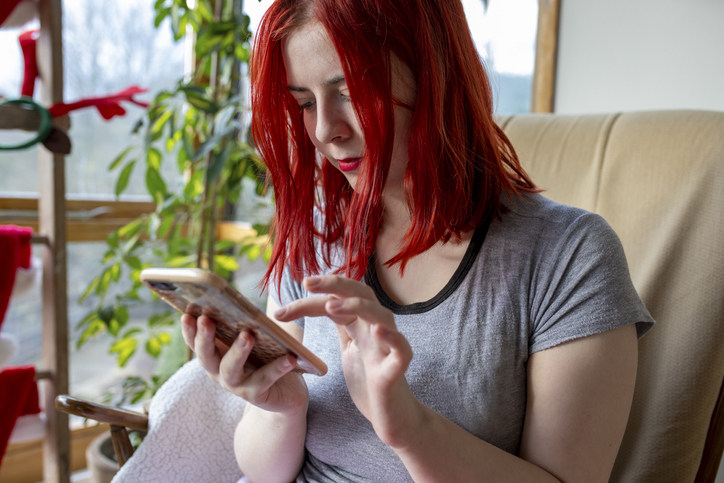Sometimes, without even realizing it, we might be putting up walls that keep others far, far away. If you’ve ever wondered why your relationships seem to hit a natural end or why people tell you you’re hard to read, you might be emotionally unavailable. Let’s look at some of the habits.
1. You’re a master of the Irish goodbye in relationships

Do you have a habit of disappearing when relationships start to get serious? This tendency to ghost when things get real is a classic sign of emotional unavailability, according to MindBodyGreen. Maybe you stop returning texts as frequently, or you suddenly become “too busy” to meet up. This is a way of avoiding the vulnerability that comes with deepening emotional connections. Instead of communicating your feelings or concerns, you simply vanish. Next time you feel the urge to disappear, try having an honest conversation instead.
2. Your emotional vocabulary is stuck in preschool

If you struggle to describe your emotions beyond “good,” “bad,” or “fine,” you might be emotionally unavailable. Maybe you know you’re upset but can’t distinguish between anger, disappointment, or sadness. This lack of granularity can make it difficult to process your feelings or communicate them to others. Try looking up lists of emotion words and practice identifying more specific feelings as they come up.
3. You’re allergic to the phrase “We need to talk”

Does the thought of a serious relationship discussion make you want to run for the hills? Maybe you change the subject when your partner wants to discuss the relationship, or you get defensive at the first sign of a serious talk. This habit of avoiding emotional discussions can prevent you from addressing important issues and deepening your connections. Next time someone wants to have a serious talk, try to stay present.
4. You’re always the shoulder to cry on, never the one crying

By focusing on others’ problems, you avoid having to deal with or express your own emotions. It can also set up an unbalanced dynamic in your relationships, where others don’t feel they can support you in return. Try opening up to a trusted friend about something you’re struggling with. It might feel uncomfortable at first, but allowing others to support you is a big part of emotional availability.
5. Your baggage is carry-on size only

If you insist that your past “doesn’t bother you at all,” you might be emotionally unavailable. While it’s great to move forward, completely dismissing the impact of past experiences can prevent you from fully processing your emotions. Try acknowledging to yourself or a trusted friend that certain past events were difficult. It’s okay to admit that things hurt you, it makes you human.
6. You’re a pro at changing the subject

Picture this: a friend starts opening up about their struggles, and you find yourself steering the conversation towards lighter topics. Or maybe your partner tries to discuss your relationship, and suddenly you remember an urgent email you need to send. Say it with us: defense mechanism. It keeps interactions surface-level and prevents others from expecting emotional engagement from you.
7. “It’s not you, it’s me” is your breakup anthem

Phrases like “I’m just not ready for a relationship” or “I need to focus on myself right now” might be true sometimes, but if they’re your go-to excuses every time things start getting serious, it’s worth examining why. This habit of ending relationships when they start to require emotional investment is a classic sign of fear of intimacy. Instead of automatically pulling the plug when things get real, try sitting with the discomfort. What are you really afraid of?
8. Netflix is your best friend (and your worst enemy)

Don’t get me wrong, we all love a good binge session. But if you reach for the remote every time you’re alone with your thoughts, take note. Emotional unavailability often manifests as an inability to sit with your own feelings, according to Verywell Mind. Using distractions like TV, social media, or even work as a constant buffer between you and your feelings is a classic sign of emotional avoidance.
9. Your self-reflection skills are a bit rusty

If you rarely take time to examine your thoughts, feelings, or behaviors, you might be emotionally unavailable. We’re not saying constant introspection is necessary, but some level of self-awareness is needed for emotional availability. Try setting aside a few minutes each day for self-reflection. You could journal, meditate, or sit quietly and check in with yourself.
10. You love keeping things “casual”

Do all your relationships come with a “no strings attached” disclaimer? You might be emotionally unavailable. Of course, casual relationships have their place, but consistently avoiding deeper connections can keep you from experiencing the depth of emotional intimacy.
11. Your calendar is always full (conveniently)

Being busy isn’t inherently bad, but when your schedule is so packed that you can’t squeeze in a heart-to-heart with a friend or a deep conversation with a partner, it can be a subtle way of avoiding emotional intimacy. After all, if you’re always on the go, you don’t have time to delve into those messy feelings, right? Making space in your schedule for emotional connections is just as important as making time for work or errands.
12. Compliments make you squirm

“You’re such a great friend.” “I love how thoughtful you are.” If these kinds of statements make you want to crawl under a rock, you might be emotionally unavailable. Accepting compliments requires a certain level of vulnerability—you have to let someone else’s positive feelings about you in. Next time someone compliments you, take a deep breath and simply say “Thank you.” Let yourself sit with the positive feeling, even if it’s uncomfortable at first.
13. Your go-to phrase is “I don’t know”

“How do you feel about that?” “I don’t know.” “What do you want from this relationship?” “I don’t know.” Sound familiar? If “I don’t know” is your automatic response to questions about your feelings, it might be a sign of emotional unavailability. The truth is, you probably do know how you feel, but accessing and expressing those feelings might feel too vulnerable.
14. Your emotional range makes a teaspoon look deep

Maybe you rarely feel extreme happiness or sadness, or perhaps you struggle to empathize with others’ emotional experiences. While it’s okay not to be highly emotional, consistently muting your feelings can disconnect you from yourself and others. Try allowing yourself to fully experience emotions as they come up, without judging them. Watch a sad movie and let yourself cry, or share in a friend’s excitement without holding back.
15. Your emotions are on a strict need-to-know basis

This habit of keeping your emotions tightly under wraps is often a defense mechanism to avoid vulnerability. It’s definitely okay to have some emotional boundaries, but consistently hiding your feelings can prevent you from forming deep connections. Try sharing a small emotion with someone you trust—baby steps can lead to bigger emotional openness over time.








